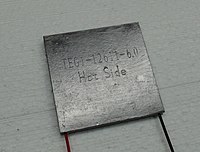
Making Ultrafast High-Capacity Anodes for Lithium-Ion Batteries via Antimony Doping of Nanosized Tin Oxide/Graphene Composites
Sign Up to like & getrecommendations! Published in 2018 at "Advanced Functional Materials"
DOI: 10.1002/adfm.201706529
Abstract: Tin oxide-based materials attract increasing attention as anodes in lithium-ion batteries due to their high theoretical capacity, low cost, and high abundance. Composites of such materials with a carbonaceous matrix such as graphene are particularly… read more here.
Keywords: capacity; anodes lithium; graphene; antimony ... See more keywords

Protein‐Functionalized Indium‐Tin Oxide Nanoantenna Arrays for Selective Infrared Biosensing
Sign Up to like & getrecommendations! Published in 2017 at "Advanced Optical Materials"
DOI: 10.1002/adom.201700091
Abstract: Plasmonic nanoantennas afford significantly enhanced near-fields that can be exploited for ultrasensitive molecular sensing in plasmon-enhanced vibrational spectroscopy. While elemental gold is usually used in plasmonic biosensing due to its stability and well-established surface functionalization,… read more here.
Keywords: indium tin; protein functionalized; biosensing; spectroscopy ... See more keywords

Low‐Voltage Operation of Ring Oscillators Based on Room‐Temperature‐Deposited Amorphous Zinc‐Tin‐Oxide Channel MESFETs
Sign Up to like & getrecommendations! Published in 2019 at "Advanced Electronic Materials"
DOI: 10.1002/aelm.201900548
Abstract: Schottky diode FET logic (SDFL) ring oscillator circuits comprising metal‐semiconductor field‐effect transistors (MESFETs) based on amorphous zinc‐tin‐oxide (ZTO) n‐channels are presented. The ZTO channel layers are deposited entirely at room temperature by long‐throw magnetron sputtering.… read more here.
Keywords: room temperature; zinc tin; amorphous zinc; temperature ... See more keywords

Boosting the Thermoelectric Properties of PEDOT:PSS via Low‐Impact Deposition of Tin Oxide Nanoparticles
Sign Up to like & getrecommendations! Published in 2021 at "Advanced Electronic Materials"
DOI: 10.1002/aelm.202001284
Abstract: Poly(3,4‐ethylenedioxy thiophene):poly(styrenesulfonate) (PEDOT:PSS) exhibits valuable characteristics concerning stability, green‐processing, flexibility, high electrical conductivity, and ease of property modulation, qualifying it as one of the most promising p‐type organic conductors for thermoelectric (TE) applications. While blending… read more here.
Keywords: properties pedot; boosting thermoelectric; pedot pss; thermoelectric properties ... See more keywords

Outstanding Performance of Hole‐Blocking Layer‐Free Perovskite Solar Cell Using Hierarchically Porous Fluorine‐Doped Tin Oxide Substrate
Sign Up to like & getrecommendations! Published in 2017 at "Advanced Energy Materials"
DOI: 10.1002/aenm.201700749
Abstract: Perovskite solar cells (PSCs) are of great interest in current photovoltaic research due to their extraordinary power conversion efficiency of ≈20% and boundless potentialities. The high efficiency has been mostly obtained from TiO2-based PSCs, where… read more here.
Keywords: hole blocking; perovskite solar; hole; doped tin ... See more keywords

A Functional Hydrogenase Mimic Chemisorbed onto Fluorine‐Doped Tin Oxide Electrodes: A Strategy towards Water Splitting Devices
Sign Up to like & getrecommendations! Published in 2018 at "Chemsuschem"
DOI: 10.1002/cssc.201701757
Abstract: Abstract A diiron benzenedithiolate hydrogen‐evolving catalyst immobilized onto fluorine‐doped tin oxide (FTO) electrodes is prepared, characterized, and studied in the context of the development of water splitting devices based on molecular components. FTO was chosen… read more here.
Keywords: onto fluorine; water splitting; doped tin; splitting devices ... See more keywords

Cathodic Stripping Voltammetric Determination of Cerium Using Indium Tin Oxide (ITO)
Sign Up to like & getrecommendations! Published in 2017 at "Electroanalysis"
DOI: 10.1002/elan.201600714
Abstract: Due to its numerous applications in the field of metallurgy and its role as an alloying element for slowing down the biodegradation of pure magnesium typically known to have very low corrosion resistance, the need… read more here.
Keywords: indium tin; determination cerium; oxide ito; cathodic stripping ... See more keywords

Electrochemical performance evaluation of tin oxide nanorod‐embedded woven carbon fiber composite supercapacitor
Sign Up to like & getrecommendations! Published in 2018 at "International Journal of Energy Research"
DOI: 10.1002/er.3827
Abstract: Summary Tin oxide (SnO2) nanorod (NR)-fabricated composite capacitors have been developed by vacuum-assisted resin transfer molding process. The NRs were synthesized on carbon fiber by following hydrothermal synthesis method. Such SnO2 grown woven carbon fiber… read more here.
Keywords: carbon fiber; energy; woven carbon; fiber ... See more keywords

Efficient Perovskite Solar Cells Based on Tin Oxide Nanocrystals with Difunctional Modification.
Sign Up to like & getrecommendations! Published in 2022 at "Small"
DOI: 10.1002/smll.202203519
Abstract: Tin oxide (SnO2 ) nanocrystals-based electron transport layer (ETL) has been widely used in perovskite solar cells due to its high charge mobility and suitable energy band alignment with perovskite, but the high surface trap… read more here.
Keywords: modification; solar cells; perovskite solar; tin oxide ... See more keywords

A Tin Oxide-Coated Copper Foam Hybridized with a Gas Diffusion Electrode for Efficient CO2 Reduction to Formate with a Current Density Exceeding 1 A cm-2.
Sign Up to like & getrecommendations! Published in 2022 at "Small"
DOI: 10.1002/smll.202205323
Abstract: The electrochemical CO2 reduction reaction (CO2 RR) is a promising strategy for closing the carbon cycle. Increasing the current density ( J) for CO2 RR products is a critical requirement for the social implementation of this… read more here.
Keywords: current density; foam hybridized; tin oxide; co2 reduction ... See more keywords

Tannic acid-modified tin oxide nanoparticle and aromatic polyamide: from synthesis to their application for preparation of safe p-PVC
Sign Up to like & getrecommendations! Published in 2020 at "Polymer Bulletin"
DOI: 10.1007/s00289-020-03160-0
Abstract: In this research, a tannic acid-modified tin oxide along with newly synthesized polyamide was used as reinforcing and anti-migration of plasticized poly(vinyl chloride) (p-PVC). Tin oxide nanoparticle was modified with tannic acid as a biobased… read more here.
Keywords: tannic acid; polyamide; modified tin; pvc ... See more keywords